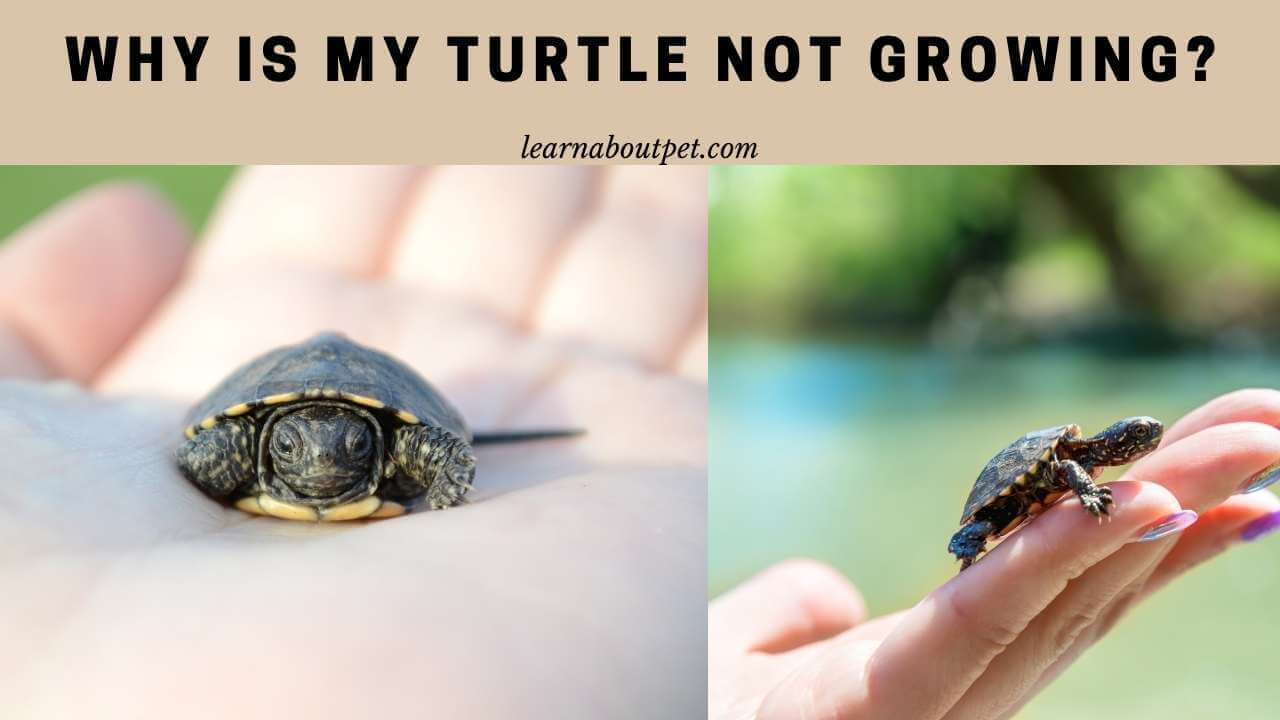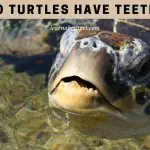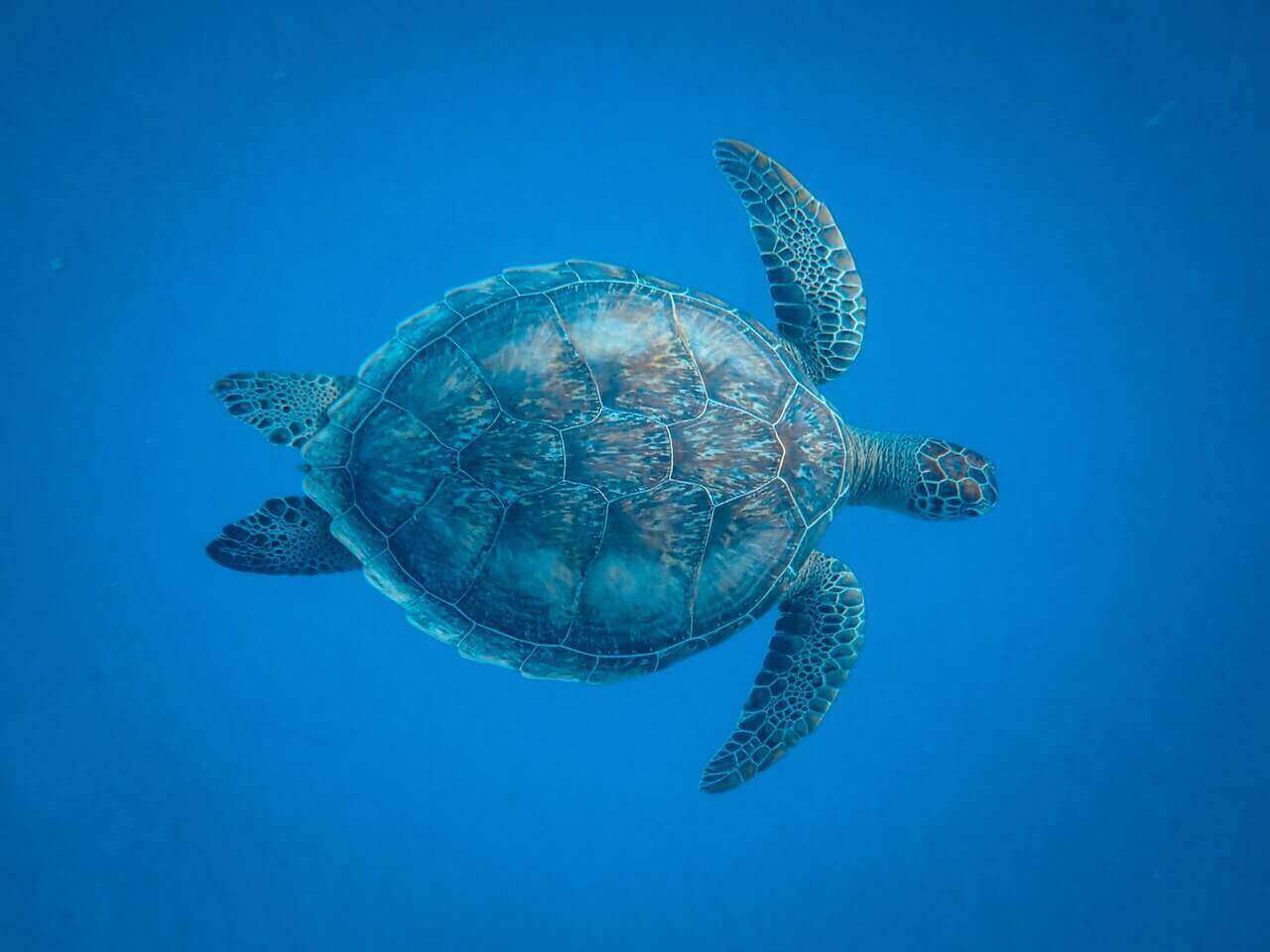You are bound to get worried, upon realizing that your turtle is not growing. You will certainly want to know what has made him stop growing, and what you can do to make him start growing again. In this article, you will find answers to the whole range of questions that revolve around turtle growth.
Why is my turtle not growing? The problem could be the turtle’s living conditions. Although they are generally easy to take care of, turtles can experience stunted growth if they are kept in conditions that are not optimal. Therefore if you notice that your turtle’s growth has slowed or stopped altogether, you need to check his living conditions. You also need to pay some attention to the turtle’s behavior.

Ultimately, the reason why your turtle is not growing could be due to poor diet. It could also be due to stress which, for instance, may be as a result of his tank being too small or too cold. It could also be as a result of illness. Another possible reason for your turtle not growing would be inadequate/improper lighting.
Of course, it could also be that your turtle has attained his full adult body size. Or it could be that the turtle is growing, but only at a rate that is so slow that you don’t notice it.
Do Turtles Grow Slow?
Before venturing to answer the question on why is my turtle not growing, we first need to understand the typical turtle growth patterns. More specifically, we need to find out whether turtles grow slow (or fast). So, do turtles grow slow? Well, the answer is generally ‘yes’ – these are animals that grow slowly, over a long period of time. For instance, in the first 5 years of its life, a turtle grows typically at the rate of 1 centimeter per year. To most people, that is quite slow growth.
Therefore before starting to wonder why is my turtle not growing, it is important to understand that these are generally slow growing animals. Therefore, what seems like ‘slow growth’ to you may actually turn out to be pretty decent growth.
How Long Does It Take A Turtle To Grow?
Further, before proceeding to answer the question on why is my turtle not growing, it is important to understand how long turtle growth typically takes. So, how long does it take a turtle to grow? The answer is that a turtle usually needs between 5 and 8 years to attain full adult body size.
Therefore if, for instance, your turtle is only two years old, and you are wondering why is my turtle still small, you need to understand that he still has lots more time to grow. Turtle growth is a matter of years, not weeks or months.
Why Is My Painted Turtle Not Growing?
It could be due to poor living conditions. It could also be due to poor health. But anyone who poses the question on why is my turtle not growing is usually advised to first measure the turtle’s body size objectively. This is a question of checking (using a ruler or tape measure) the turtle’s length and width: up to millimeter level. Then you record the measurements you get.
So you check (and record) the length and width of both the turtle’s actual body as well as its shell. Then you repeat that exercise after some time, to see if there has been growth. If, for instance, yours is a painted turtle that is within the prime growth age (0-5 years), and he goes for several months without any growth at all, it could indeed mean that there is a problem somewhere.
All in all, your painted turtle could be experiencing stunted growth due to poor feeding. His growth could also be poor due to stress. That is, for instance, the stress that arises as a result of living in a tank that is too small.
On another note, the turtle’s poor growth could also be due to lack of proper basking light or due to the water in this tank being perpetually too cold. Illness is another possible reason for your turtle’s poor growth. So those are the possibilities, if your painted turtle is not growing.
Why Is One Of My Turtle Not Growing?
If you keep several turtles, and one of them is not growing (while the rest are growing in a normal manner), it can cause you a lot of concern. This is especially likely to be the case if the living conditions for the turtles are uniform. You will definitely want to know why is my turtle not growing, yet his peers are having normal growth?
First of all, the turtle that is not growing could be ill. So you find that it is illness that is stunting his growth. Alternatively, he could just be a slow grower. You need to understand that even within the same species, different turtles may have different growth patterns.
The most important thing is to ascertain that the turtle that is not growing is not ill. If he is healthy, and is living conditions are alright, you may have no real reason to worry.
Of course, if you feed your turtles together, there could be a possibility of the one that is not growing not getting enough food. When turtles are fed together, we typically see a scenario where some gobble more food faster, even as others are left to eat the crumbs, so to speak.
You may therefore consider separating the turtle that is not growing from the pack. Then ensure that you feed him separately, and he gets adequate food, to see if there will be a change.
Why Is My Snapping Turtle Not Growing?
There are three key possibilities. First is that the turtle’s living conditions may not be conducive for fast growth. Snapping turtles require certain (very specific) dietary provisions, tank warmth conditions and lighting to grow optimally. If the conditions are not right, there won’t be proper growth.
Second is that the snapping turtle has some sort of illness that is slowing his growth.
Third is that the snapping turtle has attained his full adult size, and therefore cannot grow any further.
These, by the way, are the possibilities anyone who poses the question on why is my turtle not growing is advised to consider (regardless of the turtle species).
Why Is My Musk Turtle Not Growing?
It could be that your musk turtle is not getting enough to eat. It could also be that your musk turtle’s tank is too small, which typically hinders growth. Further, it could be that your musk turtle is ill, and the illness has affected his appetite and hormones to a level where can’t grow well. Perhaps the musk turtle is not getting enough basking light, and therefore can’t synthesize vitamin D3, which is essential for growth…
It is important to understand that real-life rearing of turtles is a demanding undertaking. If your turtle is to grow properly, there are so many things you need to pay attention to, consistently.
Real-life turtle rearing is very different from, say, the rearing of turtles in the minecraft game. How to make a turtle grow in real life is radically different from how to make a turtle grow in minecraft. Further, real life turtle rearing requires patience. Thus, how long for a turtle to grow in real life is very different from how long for turtle to grow minecraft. Consider this: in real life, getting a musk turtle to grow to its full adult size may take as many as 7 years.
Why Is My Box Turtle Not Growing?
The conditions under which you are keeping him may not be right. A box turtle is delicate, and his growth may be stunted if his living conditions are poor. For instance, if he can’t get enough UV light or if he can’t get enough food or if the the water in his tank is not warm enough, his growth will stunt. Of course, if his diet is not proper, he also won’t grow properly. Neither will he grow properly if his tank is cramped.
If his conditions are perfect, and he is still not growing properly, you need to consider the possibility of him being sick. Box turtles are prone to certain diseases, which can stunt their growth. Thus, if your box turtle is not growing, and his eyes are cloudy/closed, is lethargic, lacks appetite or has a swollen face, it could be due to illness.
On another note, the box turtle may already have attained full growth. It is important to understand how big do turtles grow (in this case, specifically box turtles)? For instance, if your box turtle is already in the 5-7 inches range, and he is between the ages of 4-6 years, he may already have attained his full growth potential. Therefore regardless of how you improve his conditions, he will be incapable of further growth.
Box turtle growth rate is quite different from, say, red eared slider growth rate. While a red eared slider can grow to 12 inches, a box turtle would typically only grow up to 5-7 inches.
Sometimes, when someone asks why is my turtle not growing, you find that they have unrealistic expectation of growth, when you consider their turtle species. A red eared slider not growing is quite different from a box turtle not growing, given their different growth potentials.

Why Is My Baby Box Turtle Not Growing?
You need to start by asking yourself whether the turtle is getting enough food. Baby box turtles need an adequate, protein-rich diet, to attain proper growth. If the baby box turtle is getting an adequate, protein-rich diet, consider his living conditions.
Check things like his tank size, tank water warmth and UV light. If all these are alright, examine the turtle for signs of illness, and consider having an exotic pet vet check on him.
Why Isn’t My Turtle Growing?
For a turtle to grow properly, he needs to be well fed, in good living conditions and in good health. So in answering the question on why is my turtle not growing, you need to have a checklist. Firstly, check whether his living conditions are ideal for proper growth. Secondly, check whether his diet is ideal for proper growth. And thirdly, check whether the turtle is in good health (not sick).
Remember, the things that turtles need to survive may not be exactly the same as those that they need to grow. Thus, the fact that your turtle is ‘surviving’ doesn’t necessarily mean that is under good living conditions. The conditions may be good enough for him to survive, but certainly not good enough for him to actually grow.
Why Hasn’t My Turtle Grown?
Much depends on how long you have had him, and what your husbandry practices are like. It is important to understand that turtles grow fairly slowly. Therefore if you have only had the turtle for a short while, you may need to give him more time to grow. But in all cases, the turtle will only grow if his diet and living conditions are proper.
Much also depends on the turtle’s species and age. If, for instance, you got a turtle that had already attained his full adult body size, it would be unreasonable to expect further growth. But if it is a baby turtle, it would be reasonable to ask why is my baby turtle not growing?
Why Won’t My Turtle Grow?
Perhaps you are not feeding him well. Perhaps you are keeping him in stressful conditions (for instance, in a tank that is too small). Or perhaps you are not providing him with adequate UV light and tank water warmth. Perhaps he is sick…
Or perhaps, given his species and age, he is incapable of any further growth. If, for instance, he is a red eared slider, it is important to know when do red eared sliders stop growing? Otherwise you could be expecting growth from a turtle that is incapable of any further growth. Indeed, it is generally good to know how long does it take for a turtle to grow full size. This way, you know when not to expect further growth.
Why Is My String Of Turtles Not Growing?
Why is my turtle not growing? String of turtles plants require good moisture, lighting, aeration and soil fertility conditions to grow. Thus, if your strings of turtles are not growing, it could be due to too little or too much soil moisture. It could also be due to inadequate lighting. Or it could be that the soil on which they are is not adequately fertile.
Why Isn’t My Turtle Growing?
It is possible that he is under stressful conditions, and they are affecting his growth. It is also possible that his diet is either inadequate or improper. You may also want to examine him, to be sure that he is not sick. Sickness can make a turtle not grow. That is the standard advice given to anyone who asks why is my turtle not growing?
How To Tell If Turtle Is Not Growing?
The best way to tell if a turtle is not growing is by taking objective measurements. Thus, you measure the turtle’s body length and width today. Then record the measurements. You also measure the turtle’s shell length and width, and record the measurements. After some time, you take the measurements again, and record them. You repeat the procedure after more time/regularly.
Eventually, you will see trends which tell you whether the turtle is growing properly, growing slowly, or not growing.
What To Do If Turtle Is Not Growing?
The most important thing is to identify the specific reason why the turtle is not growing. Then resolve that issue, so that the turtle can start growing again. If you realize that it is inadequate or improper diet, you change it.
If you realize that it is improper living conditions that are making the turtle not grow, you improve them. Where it is clear that it is sickness that is making the turtle not grow, you take him to a vet for treatment.
So you first figure out why the turtle is not growing. Then you resolve that issue (or those issues), in order to get the turtle growing again.
Final Verdict – Why Is My Turtle Not Growing?
Why is my turtle not growing? The reason why your turtle is not growing could be that its living conditions are not ideal. It could also be due to inadequate or improper diet. Further, it could be due to sickness.

The most important thing is for you to figure out exactly why the turtle is not growing. Then resolve the specific issue that is making the turtle not grow, in order to get proper growth going forward.

Welcome to Learn About Pet. My name is Rajkumar Ravichandran and I love all pets, travel, and amazing food. I write about my passion and personal experience caring for multiple pets in this blog! ❤️
Post Disclaimer
DISCLAIMER: THIS BLOG OR WEBSITE, "Learn About Pet", DOES NOT PROVIDE YOU WITH MEDICAL ADVICE AND IS NOT A SUBSTITUTE FOR MEDICAL ADVICE. ALWAYS GET IN TOUCH WITH YOUR PERSONAL VETERINARIAN AND USE INFORMATION HERE AS GENERAL ADVICE.
The information, including but not limited to, text, graphics, images and other material contained on this website are for informational purposes only. No material on this site is intended to be a substitute for professional veterinary advice, food recommendation, diagnosis, or treatment. Always seek the advice of your veterinarian or other qualified health care provider with any questions you may have regarding a medical condition or for pet food related questions.







